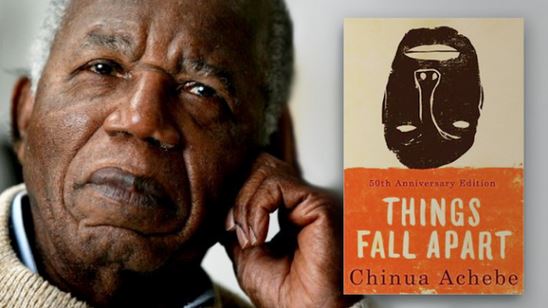The announcement of a television adaptation of Chinua Achebe’s iconic novel Things Fall Apart has sparked significant debate among Nigerians, with opinions divided over the casting choices and the broader issue of how African stories are portrayed by Western media.
The series, as reported by Variety, will feature British actor Idris Elba, known for his role in the film Beasts of No Nation. However, the inclusion of a British star in a story so deeply rooted in Igbo culture has stirred a hornets’ nest. As one online user expressed, “Things fall apart [sic] without core Igbo Actors [sic] that have the right accent will never make sense.”
At the core of this backlash lies a deeper frustration with Hollywood’s long-standing misrepresentation of Africa. Historically, the American film industry has consistently portrayed the continent in oversimplified and homogenised ways, often blending its 54 nations, thousands of languages and diverse traditions into a single, monolithic identity. This is part of a broader trend where Hollywood treats Africa as a backdrop for stories of conflict, suffering and exoticism, erasing the rich cultural and historical nuances that exist within the continent.
Even films like Black Panther, which were celebrated for their empowering depiction of African culture, were not immune to this criticism. While the film embraced African strength and heritage, it also drew on elements of fashion, language, and accents from various African regions without adequately acknowledging their specific origins.
Chelsea Nwachukwu, a film enthusiast, voiced her frustration, stating, “The horrible accent that has been termed Wakanda accent sounds the same even though we know all Africans don’t sound the same.” Nwachukwu’s complaint highlights the tendency of Hollywood productions to reduce African cultures into vague, generalised stereotypes.
Black Panther’s fictional nation of Wakanda, though groundbreaking in some respects, still situates its colonial context in Oakland, California, rather than within Africa itself, further detaching the narrative from an authentic African setting.
Similarly, the casting of non-African actors in roles that demand cultural and linguistic authenticity perpetuates this trend. As with the proposed Things Fall Apart adaptation, the decision to feature Idris Elba—a British actor—has reignited concerns about authenticity and representation in Western retellings of African stories.
Chinua Achebe’s Things Fall Apart is set in the 1890s, a period marked by the imposition of British colonial rule in Nigeria. The novel follows the life of Okonkwo, a traditionalist in the Igbo society, whose life unravels alongside his community under the weight of foreign rule. Achebe’s narrative was groundbreaking in its portrayal of African life before and during colonisation, offering a counter-narrative to the Western portrayal of Africa as a land in need of “civilising.”
The novel was adapted into a highly acclaimed Nigerian miniseries in 1987, directed by David Orere and starring celebrated local actors like Pete Edochie. The success of that adaptation lies in its use of authentic Nigerian actors, familiar with the cultural context and fluent in the nuances of the language.
For many, the idea of retelling such a deeply personal and culturally specific story through a Western lens feels like a disservice to the original work. The fear is that, like many Hollywood adaptations, the series may dilute the essence of the story and prioritise a Western perspective over an African one.
This concern is further emphasised by the fact that the proposed TV series will be managed by A24 Studios, an American production and distribution company that, as of now, does not operate in Nigeria. As Nwachukwu poignantly asks, “How do you make a movie about a country and the said country can’t access it?”
However, not all reactions to the proposed adaptation have been negative. Some Nigerians see the project as an opportunity to introduce Things Fall Apart to a global audience, a recognition that Achebe’s work deserves.
Osas Okundaye, a tech entrepreneur, expressed a balanced view: “I do think it’s problematic that they didn’t cast our actors, but if we are not telling our history, others will, and they will tweak it to suit their own prerogatives.” This statement underscores the importance of African filmmakers taking charge of their own stories and narratives, ensuring that they are told authentically and with the appropriate cultural context.
Ultimately, the debate surrounding the Things Fall Apart adaptation reflects a broader frustration with Hollywood’s portrayal of Africa. The African film industry has immense potential and a growing audience, but it remains overshadowed by the dominance of Western media. The conversation surrounding this adaptation may well serve as a catalyst for greater representation and autonomy in how African stories are told.
The announcement of a television adaptation of Chinua Achebe’s novel *Things Fall Apart* has ignited debate among Nigerians over casting choices and how African stories are portrayed by Western media. The series, set to feature British actor Idris Elba, has been criticized for not using Igbo actors, raising concerns about authenticity in representing Nigerian culture. This reaction stems from a broader frustration with Hollywood’s historical misrepresentation of Africa, reducing its diverse cultures into monolithic stereotypes.
Films like *Black Panther* have faced similar critiques despite their empowering portrayals, as they mixed African cultural elements without specific acknowledgments. The upcoming adaptation of *Things Fall Apart* is feared to continue this trend, potentially diluting the novel’s essence and prioritizing a Western perspective. The story, set during British colonial rule in Nigeria, was previously adapted into a successful Nigerian miniseries with local actors, emphasizing cultural authenticity.
Some see the new project as a chance to bring Achebe’s work to a global audience, but stress the need for African filmmakers to control their narratives to ensure authentic representations. The discussion highlights the growing desire for greater representation and ownership of African stories in global media.






